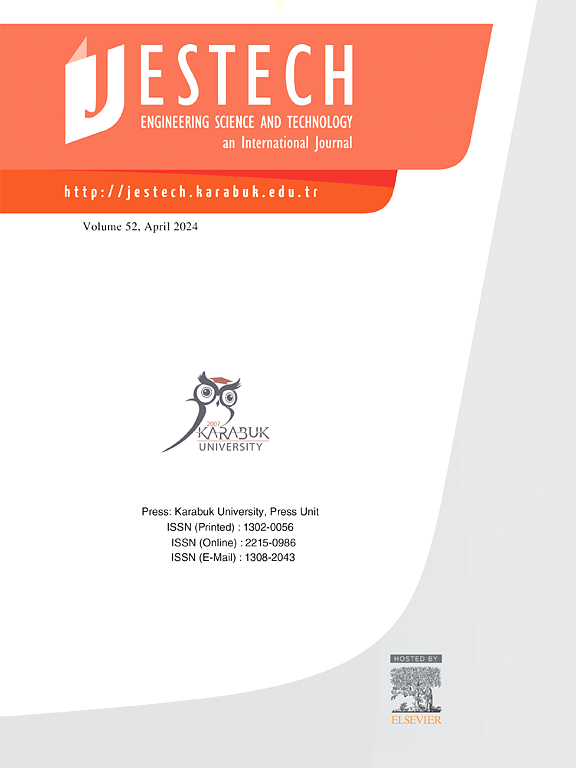Investigation of mechanical and wear properties of 17–4 PH materials produced with different patterns in atomic diffusion additive manufacturing technology
IF 5.4
2区 工程技术
Q1 ENGINEERING, MULTIDISCIPLINARY
Engineering Science and Technology-An International Journal-Jestech
Pub Date : 2025-06-20
DOI:10.1016/j.jestch.2025.102117
引用次数: 0
Abstract
This study investigates the effect of different infill patterns-Solid Fill, Gyroid Fill, and Triangular Fill-on the mechanical and tribological performance of 17–4 PH stainless steel components fabricated using the Atomic Diffusion Additive Manufacturing (ADAM) process on a MetalX™ system. Samples were produced according to the optimized parameters of the ADAM method and evaluated through density measurement, microhardness, tensile testing, transverse rupture strength (TRS), and wear tests. The Solid Fill structure exhibited the highest performance, achieving a relative density of 96.4 %, tensile strength of 948 MPa, and TRS of 1848.5 MPa. Additionally, it showed the lowest wear rate and minimal porosity. Gyroid and Triangular Fill samples offered reduced mechanical properties but presented advantages in material savings. These findings demonstrate that ADAM technology enables the production of high-performance parts with tailored mechanical properties through infill optimization, making it a promising method for advanced manufacturing sectors such as aerospace, automotive, and defense.
原子扩散增材制造技术中不同模式17-4 PH材料的力学和磨损性能研究
本研究研究了不同填充模式——固体填充、旋转填充和三角形填充——对在MetalX™系统上使用原子扩散增材制造(ADAM)工艺制造的17-4 PH不锈钢部件的机械和摩擦学性能的影响。根据优化后的ADAM方法参数制作样品,并通过密度测量、显微硬度、拉伸测试、横向断裂强度(TRS)和磨损测试对样品进行评价。固体填充结构表现出最高的性能,相对密度为96.4%,抗拉强度为948 MPa, TRS为1848.5 MPa。此外,它具有最低的磨损率和最小的孔隙率。旋转和三角形填充样品的机械性能降低,但在节省材料方面具有优势。这些发现表明,ADAM技术可以通过填充优化来生产具有定制机械性能的高性能部件,使其成为航空航天、汽车和国防等先进制造领域的一种有前途的方法。
本文章由计算机程序翻译,如有差异,请以英文原文为准。
求助全文
约1分钟内获得全文
求助全文
来源期刊

Engineering Science and Technology-An International Journal-Jestech
Materials Science-Electronic, Optical and Magnetic Materials
CiteScore
11.20
自引率
3.50%
发文量
153
审稿时长
22 days
期刊介绍:
Engineering Science and Technology, an International Journal (JESTECH) (formerly Technology), a peer-reviewed quarterly engineering journal, publishes both theoretical and experimental high quality papers of permanent interest, not previously published in journals, in the field of engineering and applied science which aims to promote the theory and practice of technology and engineering. In addition to peer-reviewed original research papers, the Editorial Board welcomes original research reports, state-of-the-art reviews and communications in the broadly defined field of engineering science and technology.
The scope of JESTECH includes a wide spectrum of subjects including:
-Electrical/Electronics and Computer Engineering (Biomedical Engineering and Instrumentation; Coding, Cryptography, and Information Protection; Communications, Networks, Mobile Computing and Distributed Systems; Compilers and Operating Systems; Computer Architecture, Parallel Processing, and Dependability; Computer Vision and Robotics; Control Theory; Electromagnetic Waves, Microwave Techniques and Antennas; Embedded Systems; Integrated Circuits, VLSI Design, Testing, and CAD; Microelectromechanical Systems; Microelectronics, and Electronic Devices and Circuits; Power, Energy and Energy Conversion Systems; Signal, Image, and Speech Processing)
-Mechanical and Civil Engineering (Automotive Technologies; Biomechanics; Construction Materials; Design and Manufacturing; Dynamics and Control; Energy Generation, Utilization, Conversion, and Storage; Fluid Mechanics and Hydraulics; Heat and Mass Transfer; Micro-Nano Sciences; Renewable and Sustainable Energy Technologies; Robotics and Mechatronics; Solid Mechanics and Structure; Thermal Sciences)
-Metallurgical and Materials Engineering (Advanced Materials Science; Biomaterials; Ceramic and Inorgnanic Materials; Electronic-Magnetic Materials; Energy and Environment; Materials Characterizastion; Metallurgy; Polymers and Nanocomposites)
 求助内容:
求助内容: 应助结果提醒方式:
应助结果提醒方式:


